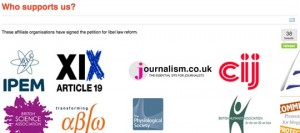Last night’s debate at the Frontline Club saw Carter-Ruck senior partner Nigel Tait (wearing a ‘Hated by the Guardian’ badge) go head to head with science writer Simon Singh and the Guardian’s David Leigh.
Also joining them on the panel was David Hooper, a media law specialist and partner at Reynolds Porter Chamberlain and chair Clive Coleman, presenter of Radio 4’s Law in Action (and a former barrister).
Catch up with the debate here:
Highlights included Tait’s version of the Trafigura super-injunction versus Leigh’s; discussion around ‘libel tribunals’ to resolve cases more quickly and more cheaply; and a chance audience encounter between a film-maker who was sued and the very lawyer that sued her.
I spoke to Simon Singh afterwards about the ongoing libel case he’s fighting over a Guardian article published in 2008. Singh is celebrating a victory in the Court of Appeal to defend his article as fair comment, but the British Chiropractic Association (BCA) has not yet dropped its case.
“The case could carry on for another two years; they could go to Supreme Court,” he said. “I’m more than happy to discuss it in a trial, the statements I made in the article.”
“I’m much happier with the position it stands now, as opposed to two weeks ago.”
But he added, he’s annoyed and angry that it’s taken a couple of years and hundreds of thousands of pounds to decide the meaning of a couple of words.
Would he encourage others to stand up as he has? “I think that everyone has to make their own judgement…. You have got to be a little bit unhinged and wealthy to fight these. Most people aren’t that unhinged and aren’t necessarily that wealthy to fight them.”
“Except,” he adds, hesitantly, “the ruling two weeks ago was quite clear, the judges said: ‘we do not want to see scientists being hauled through the libel courts’.”
“My interpretation of their ruling is that the default defence will be one of comment, which immediately gives scientists and researchers a bit more confidence if they go to trial.”

